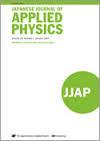Room temperature synthesis of BaTiO3 nanoparticles using titanium bis(ammonium lactato) dihydroxide
IF 1.8
4区 物理与天体物理
Q3 PHYSICS, APPLIED
引用次数: 0
Abstract
BaTiO3, known for its exceptional ferroelectric properties, is extensively applied in multi-layer ceramics capacitors (MLCCs). Achieving reliable, high-performance MLCCs requires sophisticated ceramics processes, notably in synthesizing submicron-order BaTiO3 powder with a narrow size distribution. Among various synthesis methods explored for submicron-size BaTiO3 powder, room temperature liquid-phase synthesis is most desirable due to its cost-effectiveness and large batch availability. In this study, we propose a synthesis method for obtaining BaTiO3 nanopowder at room temperature using titanium bis(ammonium lactato) dihydroxide and Ba(OH)2·8H2O as starting materials, reacted in tert-butylamine with NaOH and ethanol. The resulting powder, exhibiting a cubic phase of BaTiO3 with an average particle size of 35.8 nm, was obtained after a 7-day reaction at room temperature. Characterization involved X-ray diffraction, differential thermal analysis‒thermogravimetry, and scanning electron microscopy. Subsequently, the powder was used to sinter a BaTiO3 ceramic, whose dielectric performance was then evaluated.利用双(乳酸铵)二氢氧化钛在室温下合成 BaTiO3 纳米粒子
BaTiO3 因其卓越的铁电特性而闻名,被广泛应用于多层陶瓷电容器 (MLCC)。实现可靠、高性能的多层陶瓷电容器需要复杂的陶瓷工艺,特别是合成具有窄尺寸分布的亚微米级 BaTiO3 粉末。在亚微米级 BaTiO3 粉末的各种合成方法中,室温液相合成法因其成本效益高、批量大而最为理想。在本研究中,我们提出了一种以双(乳酸铵)二氢氧化钛和 Ba(OH)2-8H2O 为起始原料,在叔丁胺中与 NaOH 和乙醇反应,在室温下获得 BaTiO3 纳米粉体的合成方法。在室温下反应 7 天后,得到了平均粒径为 35.8 纳米的 BaTiO3 立方相粉末。表征方法包括 X 射线衍射、差热分析-热重分析和扫描电子显微镜。随后,用这种粉末烧结了 BaTiO3 陶瓷,并对其介电性能进行了评估。
本文章由计算机程序翻译,如有差异,请以英文原文为准。
求助全文
约1分钟内获得全文
求助全文
来源期刊

Japanese Journal of Applied Physics
物理-物理:应用
CiteScore
3.00
自引率
26.70%
发文量
818
审稿时长
3.5 months
期刊介绍:
The Japanese Journal of Applied Physics (JJAP) is an international journal for the advancement and dissemination of knowledge in all fields of applied physics. JJAP is a sister journal of the Applied Physics Express (APEX) and is published by IOP Publishing Ltd on behalf of the Japan Society of Applied Physics (JSAP).
JJAP publishes articles that significantly contribute to the advancements in the applications of physical principles as well as in the understanding of physics in view of particular applications in mind. Subjects covered by JJAP include the following fields:
• Semiconductors, dielectrics, and organic materials
• Photonics, quantum electronics, optics, and spectroscopy
• Spintronics, superconductivity, and strongly correlated materials
• Device physics including quantum information processing
• Physics-based circuits and systems
• Nanoscale science and technology
• Crystal growth, surfaces, interfaces, thin films, and bulk materials
• Plasmas, applied atomic and molecular physics, and applied nuclear physics
• Device processing, fabrication and measurement technologies, and instrumentation
• Cross-disciplinary areas such as bioelectronics/photonics, biosensing, environmental/energy technologies, and MEMS
 求助内容:
求助内容: 应助结果提醒方式:
应助结果提醒方式:


